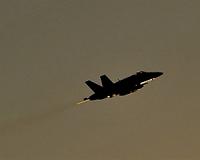| . |  |
. |
Beirut, Lebanon (UPI) May 4, 2011 As the increasingly violent uprising in Syria moves into its eighth week with no end in sight to the bloodshed, the Lebanese, gripped as ever by political crisis and concerns of another war with Israel, fear they will be dragged into the maelstrom. Lebanon and Syria have long been at odds, largely because Damascus claims its tiny neighbor is historically part of Greater Syria. But the bloodletting in Syria that erupted March 15 has aggravated a sharp buildup in tension since the Feb. 14, 2005, assassination of five-time Lebanese Prime Minister Rafik Hariri in Beirut. This has been heightened by expectations that a U.N.-mandated Special Tribunal on Lebanon based in The Hague could this month issue indictments in the Hariri assassination that implicate Hezbollah, backed by Iran and Syria. The explosive issue has been shaped by Lebanon's explosive political -- which means sectarian -- dynamic. "If the crisis in Syria drags on, it will definitely have an impact on Lebanon," said Hilal Khashan, political science professor at the American University of Beirut. "If that happens, the Syrian authorities will do their best to make sure the situation in Lebanon explodes." In this regard, Hezbollah, with Syrian encouragement, has threatened to resist with force any authority that attempts to arrest the movement's members and has done its utmost to discredit the tribunal. If Hezbollah activists are indicted and the evidence amassed by the U.N. commission that investigated Hariri's assassination strongly suggests they will be, the result could be another eruption of sectarian bloodletting between pro-Syrian factions and their pro-Western rivals. This would involve clashes not only along the traditional Christian-Muslim fault line but between rival Christian factions, primarily Maronite Catholic, and between Shiite Muslims and Sunni Muslims. The Damascus regime was widely blamed for the death of Hariri, a Sunni billionaire statesman who turned against Syria's domination of Lebanon that began in 1976 during the Lebanese civil war. Damascus vehemently denied that, even though it was highly unlikely that a plot of that magnitude could have existed without the knowledge of Syria's pervasive intelligence services. Hezbollah, ideologically Iran's ally, depends on Syria for its supply links to Iran, so it has a vested interest in not seeing the Baathist Damascus regime of President Bashar Assad collapse. It is the same for does Iran, Syria's strategic ally, which needs Lebanon to threaten Israel. Damascus has already accused Lebanon's U.S.-backed Future Movement, led by Saad Hariri, Rafik Hariri's son, of supporting, and even arming, its domestic opponents in the current turmoil. It named Future Movement legislator Jamal Jarrah of masterminding the gunrunning and produced three members of a "terrorist group" to confess on state television in April. The Future Movement and Jarah, deny the accusations. But many in Lebanon see the Syrian move, which seeks to substantiate the regime's claim outside forces are plotting against it, as a sign that their country, so coveted by Syria, could suffer harshly from the consequences of the upheaval next door. "Merely stating that Lebanese parties are interfering in Syrian affairs is equivalent to threatening to destabilize Lebanon, irrespective of whether charges of funding and arming the protesters are accurate," said Ghassan al-Ezzi, professor of political science at the state-run Lebanese University. The uprising in Syria was initially triggered by the arrest of some youngsters who scrawled anti-regime slogans on a schoolhouse wall. But it morphed into a large-scale campaign for regime change, along the lines of the uprisings in Egypt, Tunisia, Yemen, Libya and Bahrain. The irony is that the Americans, Europeans, Israelis and even some Arabs don't want Assad to fall because he could be replaced by the Muslim Brotherhood, the largest and best organized opposition group. The Muslim Brotherhood is Sunni to the core, as are 74 percent of Syria's 22 million people. Lebanon's Sunnis, one-fifth of the 4 million population, are led by Saad Hariri, the outgoing prime minister toppled in a Syrian-backed, Hezbollah-led political coup in January. Middle East analyst Talal Atrissi says a crackdown by Assad against Hariri and his Future-led March 14 alliance, if the Syrian regime crushes its domestic opponents, is an "option on the cards." "If Assad succeeds in crushing the opposition in Syria, this will definitely lead to a new situation in Lebanon, where March 14 groups and the Future Movement will come under new pressure," he observed.
Share This Article With Planet Earth
Related Links
 Two loud blasts as jets overfly Tripoli
Two loud blasts as jets overfly TripoliTripoli (AFP) May 4, 2011 Two loud explosions were heard early Wednesday as jets overflew the Libyan capital Tripoli, days after the regime said Libyan strongman Moamer Kadhafi escaped an air strike that killed one of his sons. Gunfire rang out following the second strike. Early on Sunday, government spokesman Mussa Ibrahim said that Seif al-Arab Kadhafi, one of the Libyan leader's sons, and three of his grandchi ... read more |
|
| The content herein, unless otherwise known to be public domain, are Copyright 1995-2010 - SpaceDaily. AFP and UPI Wire Stories are copyright Agence France-Presse and United Press International. ESA Portal Reports are copyright European Space Agency. All NASA sourced material is public domain. Additional copyrights may apply in whole or part to other bona fide parties. Advertising does not imply endorsement,agreement or approval of any opinions, statements or information provided by SpaceDaily on any Web page published or hosted by SpaceDaily. Privacy Statement |